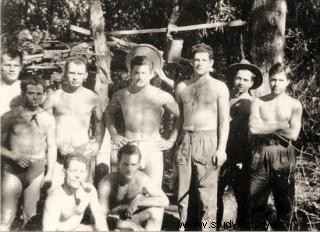
A delicious beach of fine sand, lined with coconut palms. The surf breaks in powerful rolls. We are in Harnai, a small fishing town, south of Bombay. We're settled in an old waterside fort on the peninsula and we're starting our 'sea course'.
British forces in the Far East have just touched down four-engined “Liberators” which will henceforth make it possible to parachute agents into Malaysia or Indochina, but until now, the commandos have been deposited mainly by submarine in the territories occupied by the Japanese. It's still the only way to land in the whole sector beyond Singapore or beyond the Annamite Range.
We must be particularly trained in exchanging signals with the submarine , to hold appointments at the exact point, to be able to disembark on the coast with all our equipment, at night and despite the surf; rowing and paddling for hours in the harshest currents or roughest waters.
Above all, we have to practice swimming. Up in the sun, we start our day with a long cross along the beach, in the rocks and in the sand, which ends with a dip in the water and swimming through the surf. After breakfast, work until lunch, which means, during the first eight days, surfing with fold boats. The surf, or the bar, made up of several successive rolls, overturns any misdirected boat.
As the waves follow one another without regularity and are never in the same direction, the art consists in trying to keep the boat always perpendicular to each blade that takes it from behind. Otherwise, it's the reverse and the whirlwind of the rollers, from which we emerge half asphyxiated, the boat on one side, the paddles on the other, the equipment elsewhere. You have to go fishing, turn the boat around (avoiding the next roll), empty it, get back on board and try again. The shock of the roll knocks you out halfway, suffocates you. If, by chance, you succeed in successfully crossing the three or four successive rollers, then you are launched at high speed and land fifty meters on the sand. In the afternoon, until 5 p.m., to recover, we paddle or row. Our arms hurt from the straining.
Several times a week, we cross the bad passage between the island and the land, where the sea is always rough. We then have air tubes along our fold boats, to make them safer. Two or three times a week, after rowing all day, we start again at 9 p.m. and do not return until after 2 a.m. - you at night offshore, rendezvous exercises on a distant coast (still rowing), recovery of equipment floating at sea in a precise azimuth and which must be fetched in the distance, obviously still by force of arms.
We now go almost every day to the island. The operation is still tough, because you have to cross the agitated arm of the sea, and approach the coast of the islet, jagged, steep, rocky and where the sea beats constantly. We break many paddles there. We carry out the same night operation two or three times a week, trying to approach quietly and thwarting the sentries.
The days pass:swimming, surfing, paddle, surfing, swimming, rowing, night exercises. A final major “combined” exercise closes the course. We have to go by night in a boat upriver from the fishing village, disembark there unseen, go over the mountain to the railway line and sabotage it, that is to say, install on the rails and switches of the complete modeling clay with wires, primers, detonators..., all without powder; we must then leave by another route, find our canoes and return.
To make matters worse, the local police and volunteers having been informed of our company and guarding the coast and the railway line, we must expect a harsh reception.
Passing from north to south, from east to west, our courses take us to all corners of the Indian continent. This time we find ourselves in the humid heat of the Bengal summer.
Our residence located in a park surrounded by high walls is some 20 kilometers from the center of Calcutta. In our moments of leisure, we swim in the brackish and muddy waters of the Hoogli, a branch of the Ganges, which carries everything, trunks, branches, rats and dead dogs, sometimes corpses.
We have so far been trained to live in the jungle, to familiarize ourselves with all the techniques of survival or commando combat. We must now learn to fight also by the verb and to organize.
Our mission, once we have been introduced behind the Japanese lines, will not only be made up of ambushes and sabotages, but will also consist of organizing guerrillas, leading maquis, raising populations against the occupier.
